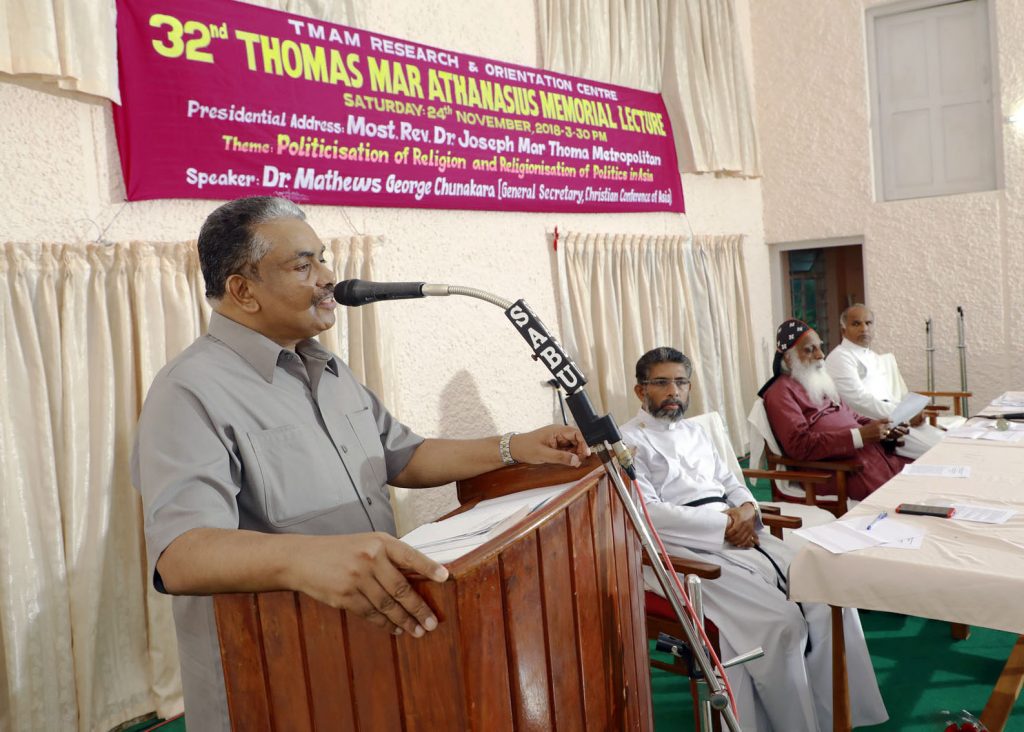Politicisation of Religion and Religionisation of Politics become pervasive social phenomena in Asia, says CCA General Secretary
 CCA General Secretary Dr. Mathews George Chunakara delivers Thomas Mar Athanasius Memorial Lecture
CCA General Secretary Dr. Mathews George Chunakara delivers Thomas Mar Athanasius Memorial Lecture
“As the increasing trend of religion assumes major roles in civil and political affairs, politicisation of religion and religionisation of politics have become a pervasive social phenomenon in Asia today”, said the General Secretary of the Christian Conference of Asia (CCA), Dr. Mathews George Chunakara.
Delivering the 32nd Thomas Mar Athanasius Suffragan Metropolitan Memorial Lecture on the topic ‘Politicisation of Religion and Religionisation of Politics in Asia’, the CCA General Secretary told the gathering at the Bethel Aramana auditorium Manganam, Kottayam in the Southern Indian state of Kerala, on 24 November 2018, that “the emerging trend with regard to religion and politics is that religion becomes a dividing force in its more intensive and durable forms; it creates not only a religious rift, but also a threat to communal and social harmony in several Asian countries that were once known for tolerance and liberal human values.”
While illustrating examples of the increasing trend of politicisation of religion, the CCA General Secretary said, “Asia, the most populous as well as religious region in the world today faces punitive forms of religious activism, which leads to an unimaginable scale of religious hatred and violent religious extremism even in traditionally tolerant countries”, added Mathews George Chunakara.
“It is becoming an increasing trend in Asia that religion is being used as an effective instrument in order to create specific vote banks. The problem, by and large, persists in the assumption that parties or movements are only successful in securing votes, if they invoke religious identity during elections”, said the CCA General Secretary.
“The other trend of religionisation of politics is mainly due to the strategies used by certain religious groups to devise and carve roles for themselves in politics or by securing preferential treatment and favours from the ruling elites whether they are democratically elected or military rulers. In many other contexts, political parties and leaders position themselves as true champions of faith and customs of religious traditions”, illustrated Mathews George with examples from current situations of Buddhist, Hindu and Muslim majority countries in Asia.
Quoting an ancient adage that “religion is like a candle, it can also set fire; the choice is one’s own what use is made of it”, the CCA General Secretary hoped that adherents of all religions in Asia would use the candle to spread more light in darkness.
Dr. Joseph Mar Thoma Metropolitan, the supreme head of the Malankara Mar Thoma Syrian Church inaugurated the public events related to the Memorial Lecture.
Thomas Mar Athanasius memorial lecture is organised annually by the TMAM Centre in memory of the late Suffragan Metropolitan Thomas Mar Athanasius who was an outstanding theologian, missiologist, spiritual guide and a pragmatic ecumenist. As a youth, he actively participated in the world ecumenical youth movement through the Student Christian Movement and the World Youth Assemblies in the 1940s and 1950s. He subsequently served on the Faith and Order Commission and the Council for World Mission and Evangelism of the World Council of Churches for several years.










